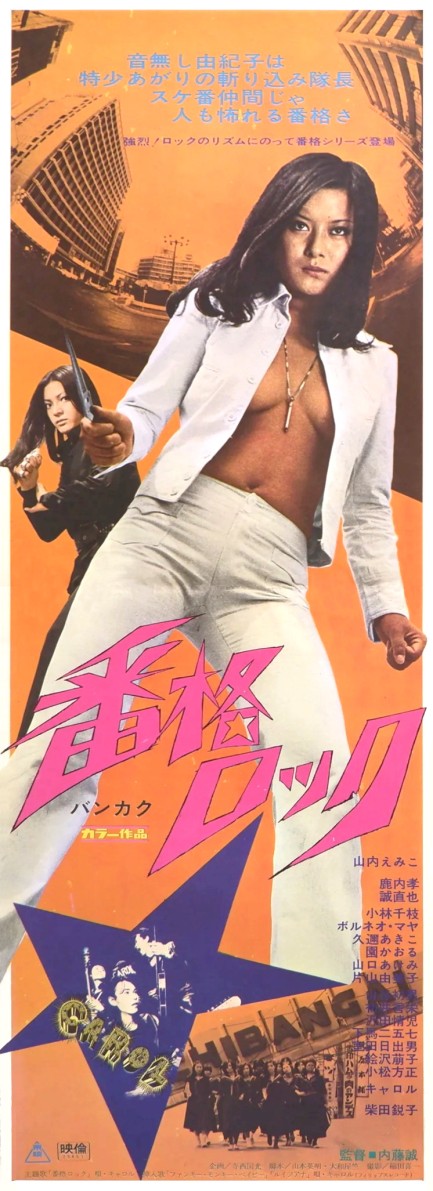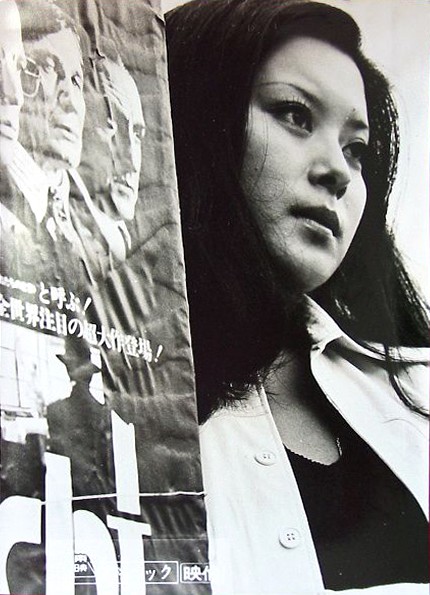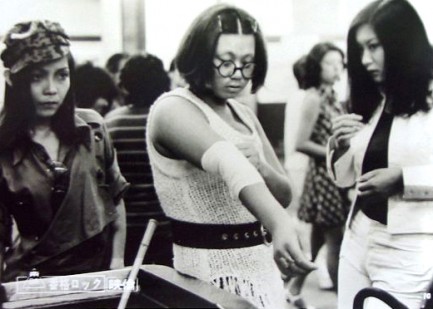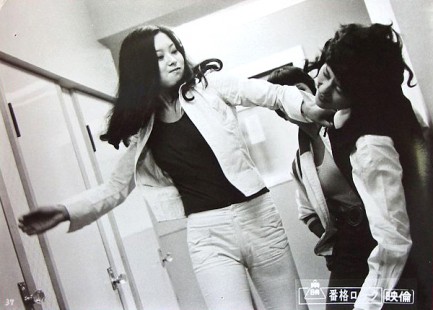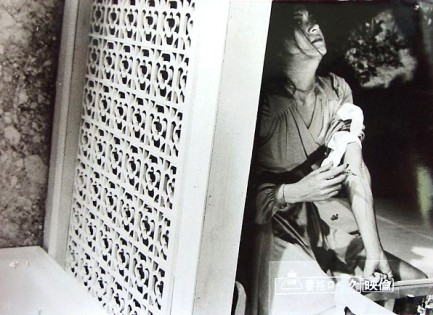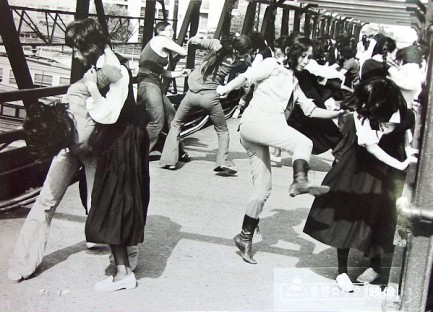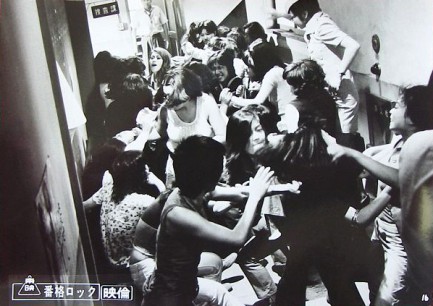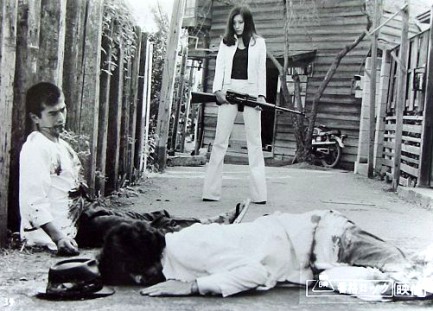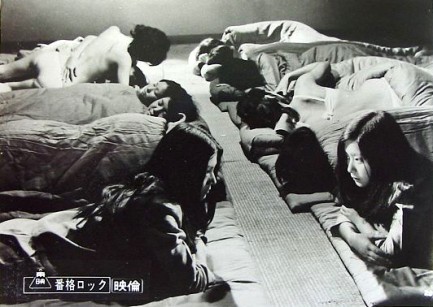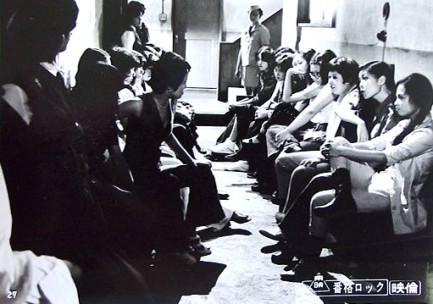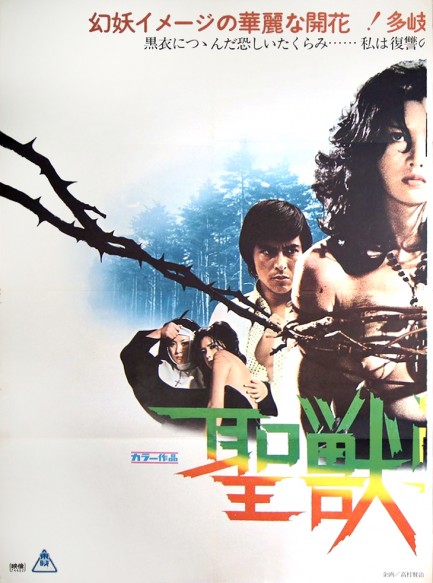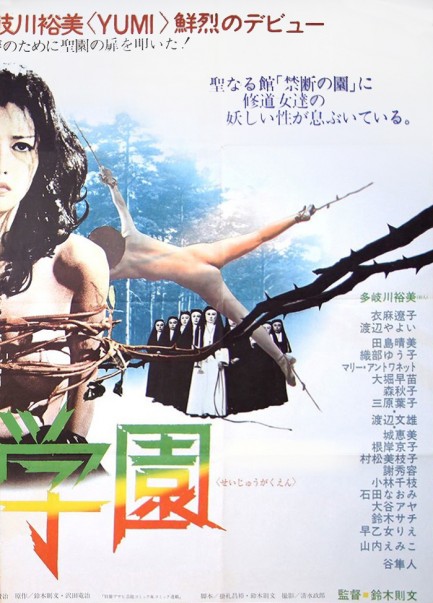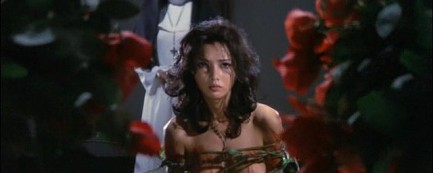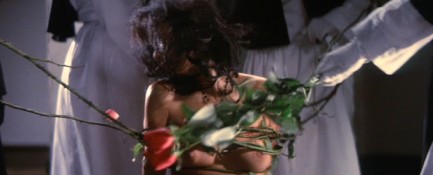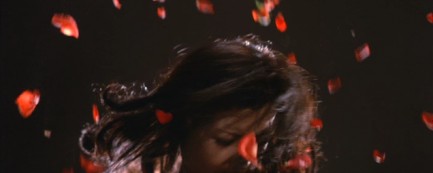 Yamauchi and Shibata are back for an encore. 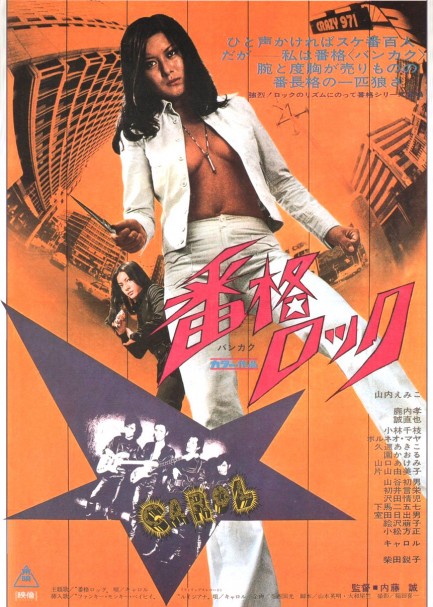
Several years ago we shared a rare tateken sized poster for Bankaku Rokku, aka Bankaku Rock, aka Ranking Boss Rock, and today, above, we're circling back to the film with the hansai sized poster, which we usually just call standard sized. We didn't share this in the earlier post because we didn't have it then. It just wasn't available at the time. That omission is now rectified. Something else that wasn't available back then was the movie. Well, we found that too. Our efforts are unceasing.
Bankaku Rokku is a juvie delinquent pinky violence flick in which the Akabane 100 Club and Ikebukuro Cavalry battle for supremacy. Emiko Yamauchi plays Yukiko, the “bankaku,” or chief bodyguard of the Akabane 100. When she's released from reform school she decides to settle an old score with the Cavalry gang's leader Taka, played by Etsuko Shibata. But Yukiko's revenge gets complicated when she's accused of a murder that was actually the work of Johuku Clan, a male gang of pimps and thieves.
This flick is all alienation and disaffection. When the police come looking for Yukiko her authoritarian father even urges them to give her the death penalty. Will Yukiko dodge the cops and get her sweet revenge? It wouldn't be pinky violence if she didn't at least get the chance. Broken bottles, supersharp scissors, and razor blades are the order of the day, along with numerous boobs and climactic bloodspray. There may not be much of a point to it all, but for pinky violence fans it should hit the spot. Bankaku Rokku premiered in Japan today in 1973. 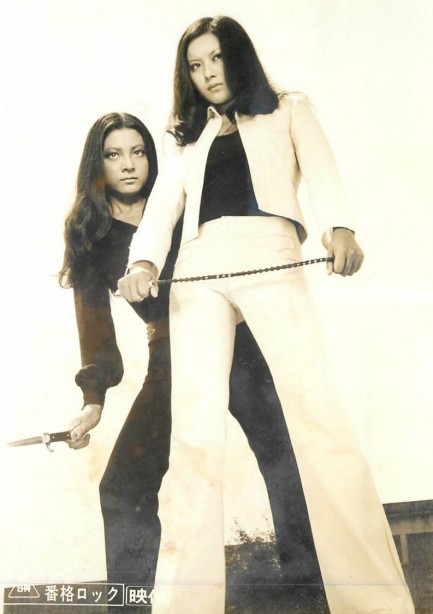
 The bright lights look pretty but they can blind you to the danger. 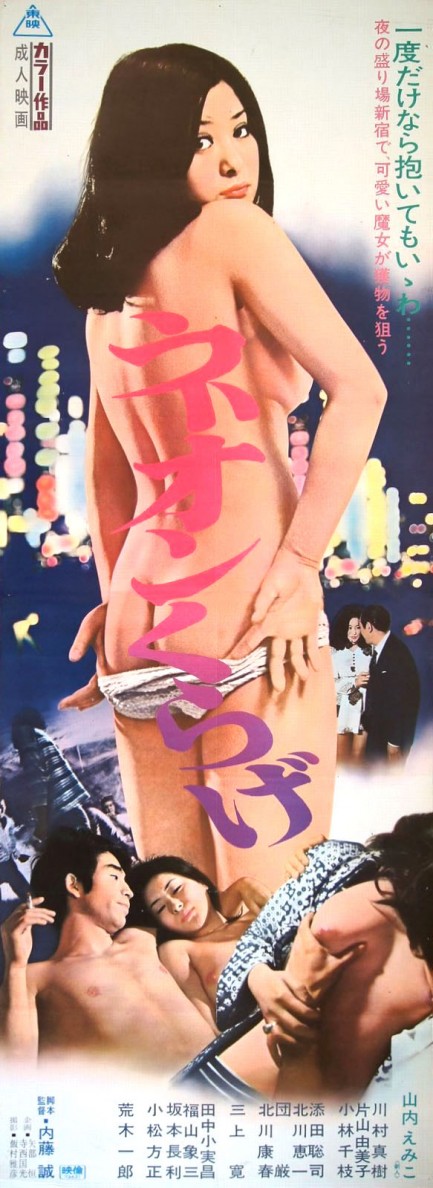 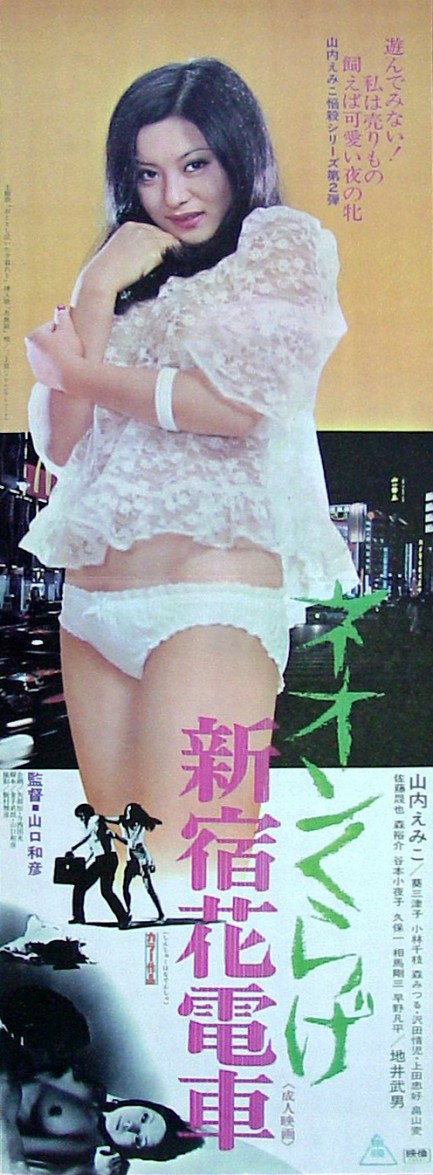
These two panel length posters promote the pinku flicks Neon kurage and its sequel Neon kurage: Shinjuku hanadensha. We also have a normal promo for Neon kurage below. The movies, though well known, never had any Western releases as far as we know, but would be called Neon Jellyfish and something like Neon Jellyfish: Shinjuku Float. Shinjuku is a place, but we were unsure on the “float” aspect until we looked it up. It seems to derive from a type of Japanese streetcar decorated with flowers in the manner of a parade float, but its secondary meaning has something to do with sexual performance, specifically vaginal insertions of, well… anything from blowguns to ping pong balls. The movie is alternately titled, according to some sources, Neon Jellyfish: Shinjuku Flower Streetcar. You’ll see no actual vaginal gymnastics in these movies. They’re about as explicit as your average Cinemax feature, though as we’ve mentioned before, not being able to show anything actually makes the directors—in these instances Naito Makoto and Kazuhiko Yamaguchi—go the extra mile with visual tricks and clever juxtapositions. The story in both movies revolves around star Emiko Yamauchi’s employment in seedy Tokyo sex bars. In the first movie she’s pursued by a photographer who uses devious means to turn her into a nude model, and in the second she escapes her village in the sticks and meets a professional cyclist who’s tangled up with some thugs in a race-fixing racket. Problems ensue in both instances. Yamauchi only appeared in a handful of productions, but the term masterpiece was thrown around by some critics when writing about Neon Jellyfish. Yamaucho was also in School of the Holy Beast, which we discussed here. As a side note, there are dozens of websites now offering to stream or sell or preview this genre of movies, but of course they have nothing but malware and viruses. We are immune, thanks to Apple. If you aren’t, don’t dare go looking. You’ll get stung right in the hard drive. Neon kurage premiered June 20, 1973, and Neon kurage: Shinjuku hanadensha premiered today the same year. 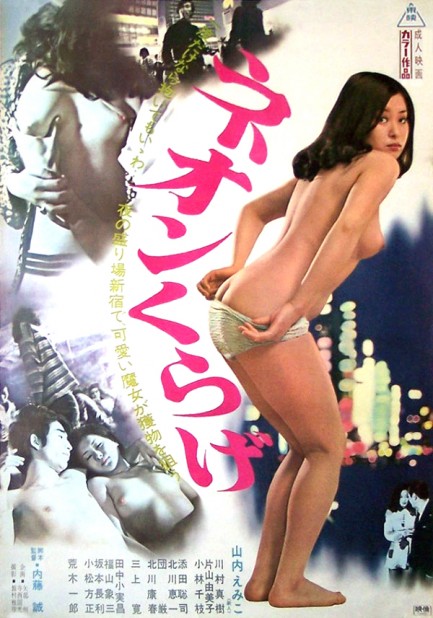 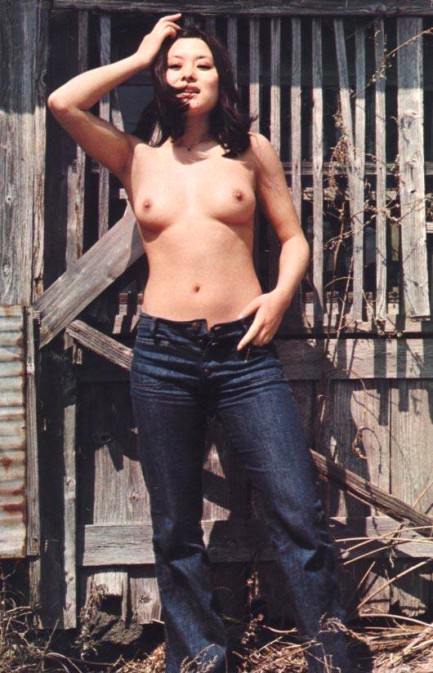
 Who said life couldn’t be a bed of roses? 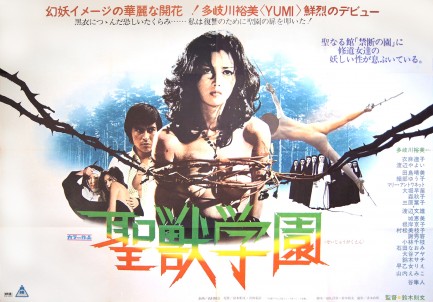
Way back in 2009 two promos for Seijû gakuen were the first pinku posters we ever shared on Pulp Intl. Ah, the good old days. We got the title wrong and misspelled the name of the star, but other than that, what a glorious memory. When we located that pair of posters we also found two others, and now, years later, we’re getting around to sharing those too. Seijû gakuen was known in the West as School of the Holy Beast, and above you see a rare two panel horizontal poster. At that orientation it renders a little small here, so we’ve posted the panels seperately below:
The second poster we wanted to share is a somewhat less colorful effort, but still quite nice, with a splash of rose pink in the middle. You see that below:
In addition to starring Yumi Takigawa, Seijû gakuen had Emiko Yamauchi and Pulp fave Yayoi Watanabe, and as we mentioned in the previous post, it’s nunsploitation from Toei Studios. As you no doubt have deduced, Takigawa goes through all kind of indignities, and at one point is bound with vines and whipped across her naked torso by two nuns using bouquets of roses (and, more importantly, their thorns). It’s a bizarre and bloody but beautifully shot spectacle.
Lastly, just below, we’ve decided to share a promo image of Yumi Takigawa looking her radiant best. She spends a good portion of the movie wearing a nun’s habit that covers everything except her face. If Toei and director Norifumi Suzuki wanted a lead actress whose face could be isolated in that manner yet still hold an audience’s attention they succeeded. Seijû gakuen was Takigawa’s first film but not her last—she’s still quite busy as an actress, appearing mainly on television. Seijû gakuen premiered today in 1974. 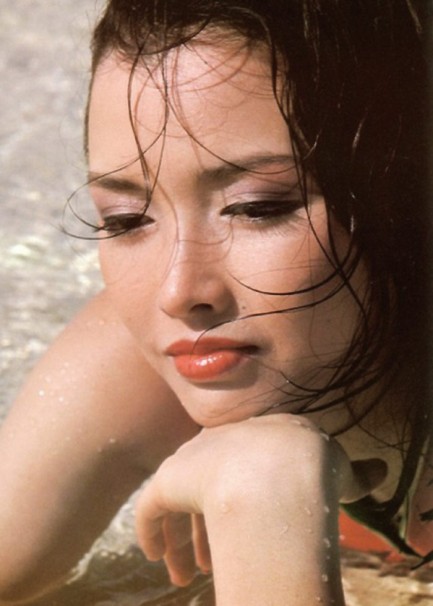
|
 |

The headlines that mattered yesteryear.
1933—The Gestapo Is Formed
The Geheime Staatspolizei, aka Gestapo, the official secret police force of Nazi Germany, is established. It begins under the administration of SS leader Heinrich Himmler in his position as Chief of German Police, but by 1939 is administered by the Reichssicherheitshauptamt, or Reich Main Security Office, and is a feared entity in every corner of Germany and beyond. 1937—Guernica Is Bombed
In Spain during the Spanish Civil War, the Basque town of Guernica is bombed by the German Luftwaffe, resulting in widespread destruction and casualties. The Basque government reports 1,654 people killed, while later research suggests far fewer deaths, but regardless, Guernica is viewed as an example of terror bombing and other countries learn that Nazi Germany is committed to that tactic. The bombing also becomes inspiration for Pablo Picasso, resulting in a protest painting that is not only his most famous work, but one the most important pieces of art ever produced. 1939—Batman Debuts
In Detective Comics #27, DC Comics publishes its second major superhero, Batman, who becomes one of the most popular comic book characters of all time, and then a popular camp television series starring Adam West, and lastly a multi-million dollar movie franchise starring Michael Keaton, then George Clooney, and finally Christian Bale. 1953—Crick and Watson Publish DNA Results
British scientists James D Watson and Francis Crick publish an article detailing their discovery of the existence and structure of deoxyribonucleic acid, or DNA, in Nature magazine. Their findings answer one of the oldest and most fundamental questions of biology, that of how living things reproduce themselves. 1967—First Space Program Casualty Occurs
Soviet cosmonaut Vladimir Komarov dies in Soyuz 1 when, during re-entry into Earth's atmosphere after more than ten successful orbits, the capsule's main parachute fails to deploy properly, and the backup chute becomes entangled in the first. The capsule's descent is slowed, but it still hits the ground at about 90 mph, at which point it bursts into flames. Komarov is the first human to die during a space mission.
|

|
|

It's easy. We have an uploader that makes it a snap. Use it to submit your art, text, header, and subhead. Your post can be funny, serious, or anything in between, as long as it's vintage pulp. You'll get a byline and experience the fleeting pride of free authorship. We'll edit your post for typos, but the rest is up to you. Click here to give us your best shot.

|
|




